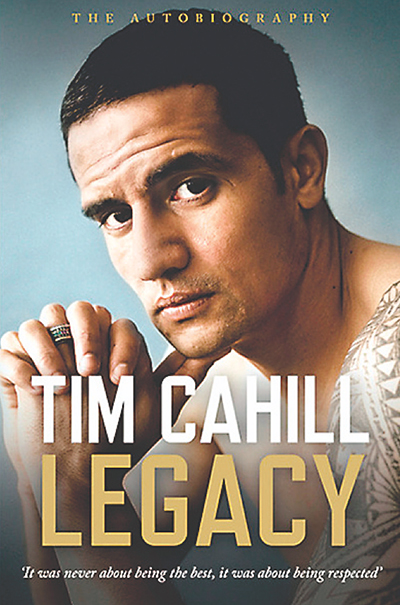 The autobiography ŌĆ©of Tim Cahill
The autobiography ŌĆ©of Tim Cahill
by Tim Cahill
HarperSport, ┬Ż18.99
Reviewed by Jamie Rainbow
From WSC 350 April 2016
When Tim CahillŌĆÖs contract with Shanghai Shenhua was terminated, a number of A-League clubs approached the midfielder offering him the chance to finish his playing career in Australia. But, as he reveals in Legacy, heŌĆÖd already snubbed an earlier return to his homeland for commercial reasons. The 36-year-old, fast approaching the end of his playing career, was already thinking about life after football. Or, to use CahillŌĆÖs own slightly nausea-inducing phrase, he had to ŌĆ£strategize as a businessmanŌĆØ.
This kind of marketing jargon starts to creep in towards the end of the book when Cahill lays out his plans for the future. As part of the transition from footballer to businessman, he has already launched coaching apps, a range of clothing, and even a line of childrenŌĆÖs books. A more cynical person might wonder whether the autobiography itself is merely a marketing ruse aimed at introducing ŌĆ£Brand CahillŌĆØ to a wider audience.
No great surprise to learn, then, that Cahill cites David Beckham as an inspiration. The similarities between the two donŌĆÖt end with his business acumen. Both men profess a love for football and both, superficially at least, seem level-headed sorts, unaffected by their success. From Legacy we learn that Cahill is a loving son, loyal brother, protective father, good friend, dependable team-mate and all-round good egg. Like Beckham, he was not blessed with outstanding natural attributes, but had to rely on hard work along with vast reservoirs of determination and self-belief to achieve success. The anti-Harry Kewell, if you like.
To his credit, Cahill pays generous tribute to family members, coaches and fellow players who have helped him get to where he is now. One such person, David Moyes ŌĆō who writes a sincere and touching foreword to Legacy ŌĆō described the Australian as the best thing that happened to Everton during his time at Goodison Park. You can see why Moyes regarded him as a kindred spirit and the perfect man to lead the line when trying to grind out another tenacious ŌĆ£dogs of warŌĆØ style 1-0 win.
So, while there is much to admire about CahillŌĆÖs playing achievements, there is a little less to enjoy about the way in which Legacy tells his life story. The edges of what appear to be a spiky character have been blunted to the point of blandness and we are left with a disappointingly vapid narrative. In some ways, Legacy is precisely the kind of autobiography one would expect Cahill to write: earnest, workmanlike and loyal, but lacking flair and self-doubt.
ItŌĆÖs a shame because there is an interesting story to be told. From humble beginnings in Australia, the product of a football-mad English father and a Samoan mother, to his arrival in England as a teenager without even the promise of a trial with Millwall let alone a contract, culminating in him becoming arguably his countryŌĆÖs greatest football export. The narrative arc is there: from CahillŌĆÖs childhood when football was derided as a game for immigrants (ŌĆ£wogballŌĆØ) to the 2015 Asian Cup triumph which confirmed its place at the centre of the sporting culture; but something ŌĆō possibly a compelling voice ŌĆō is missing.